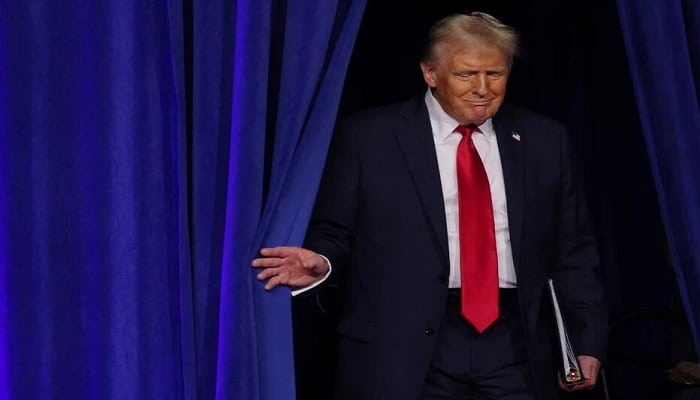PNN – The New York Times newspaper wrote: Donald Trump will face a completely different region in his second term of office due to significant developments in the Middle East since the October 7 attacks (Al-Aqsa storm).
According to the report of Pakistan News Network, this American newspaper added: Political observers close to President-elect Trump have known for a long time that predicting his decisions is foolish. But in relation to foreign relations, especially for the Middle East, they believe that the second term of Trump’s presidency will undoubtedly be different from the first term in many ways.
This newspaper added that since the attacks of Hamas against the positions of the Zionist regime on October 7, when the balance of power in this region was upset, and according to the priorities of those who played the main role in it, the situation in the region has changed significantly.
During the first term of Trump’s presidency and during most of Joe Biden’s presidency, the demands of the Palestinians for the formation of an independent state received little attention. (The regime) Israel controlled the West Bank and Gaza was under a heavy siege, which seemed to continue indefinitely.
But the attacks of Hamas and the war and alignments that followed changed everything. America once again became deeply involved in the region and provided military support for Israel’s war against Hamas in Gaza and Hezbollah in Lebanon. There was also widespread anger against Israel for its role in killing thousands and displacing millions. These actions have once again drawn attention to the Palestinian issue.
Read more:
American official: the actions of the Yemeni army are amazing / we must move away from the Red Sea
Changing the balance of deterrence between Iran and Israel (regime)
The New York Times wrote: Before the Hamas attacks, Iran and Israel (the regime) were engaged in a shadow war, but neither wanted to enter into a full-scale conflict and maintained a balance of mutual deterrence.
But this balance was shaken in the October 7th attack and was further weakened by Israel’s (regime) attacks on Iran’s diplomatic centers in Syria, the assassination of the Hamas leader in Tehran, and the destruction of Hezbollah’s leadership. Iran carried out two massive missile attacks against Israel (regime), which was responded to by this regime’s cautious attacks against Iran’s air defense and missile production facilities.
The New York Times wrote: If Iran and Israel (regime) cannot achieve a new balance of deterrence against each other, the intensity of their conflicts will increase and it will probably bring other countries to this conflict.
Relations between Iran and Saudi Arabia; From the Cold War to de-escalation
This American newspaper wrote in another part of its report about the developments in the region: Iran and Saudi Arabia spent most of the 2010s in a proxy war until the Cold War in the Middle East. Iran supported Shia groups in the region and Saudi Arabia exerted influence through its Sunni proxies.
This situation changed with China’s mediation in March 2023 and the re-establishment of relations between Iran and Saudi Arabia. The two countries agreed to reopen their embassies, revive old security agreements, refrain from attacking each other even through their proxy groups, reduce media rhetoric, and refrain from interfering in each other’s internal affairs.
The failure of the normalization agreement between Saudi Arabia and Israel
Newsweek continued: Before the October 7 attacks, Saudi Arabia and (the) Israeli (regime) were on the verge of an agreement to normalize their relations that had the potential to reshape the Middle East. Israeli Prime Minister Binyamin Netanyahu hoped that such an agreement would lead to the creation of a form of NATO in the Middle East and would create closer security ties between Israel and the Gulf states, while further strengthening Iran and its allies.
Now, things look very different. Israel’s wars in Gaza and Lebanon have made Saudi Arabia and other countries unable to establish normal relations with Tel Aviv unless significant concessions are made, including the commitment to the formation of a Palestinian state, but Israel’s opposition to a two-state solution is now stronger than before.
Combining this issue with the issue of de-escalation in Iran-Saudi relations creates the possibility that the new order in the region will isolate Israel (regime) more than Iran.
Trump’s unpredictability
This newspaper continued to write: During the first term of Trump’s presidency, many argued that he was following a “mad man’s strategy” in foreign affairs. This strategy suggests that you may back off if your opponents think you are too volatile to pursue a threat despite the devastating consequences. But at the same time, this strategy can be reasonable in relation to enemies, whose irregular behavior with friendly countries can also cause them to retreat and lead them to form new alliances.
The 2019 missile attack on Saudi oil facilities caused the United States to accuse Iran of these attacks, although Yemen’s Houthis claimed responsibility for it. Trump said he was in “no rush” to react because he did not want to take America into war. According to the report of the International Crisis Group, apparently this reaction caused Saudi Arabia to seek to re-establish relations with Iran.

